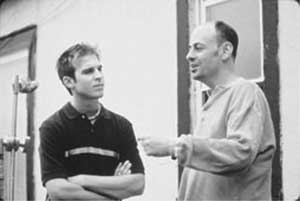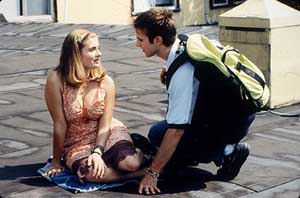-
- Bush: gays are sinners
- California bans discrimination against transgender citizens
- Mass. court could make history with gay marriage ruling
- National HIV prevention conference ends on sour note
- Openly gay bishop-elect cleared of misconduct allegations
- NYC defends gay high school despite threat of lawsuit
- National News Briefs
- World News Briefs
Arts & Entertainment
Writer-director Todd Graff talks about his campy new film, ‘Camp’
Quirky summer comedy breaks barriers with ease in which youthful gay sexuality is handled
Published Thursday, 07-Aug-2003 in issue 815
Actor-writer-producer Todd Graff wasn’t able to attend the June preview screening in La Jolla of his directorial debut, Camp, an infectious, high-spirited musical comedy-drama set at a summer camp for aspiring actors and singers. When told that many of the youngsters from the film were in attendance, clapping, giggling and constantly checking their cell phones, he said, with a paternal edge, “You should have kicked their asses — I would have, if I had been there.”
Graff knows a little about the “middle-class suburban version” of being a bad kid. At 14, his parents sent him to Stagedoor Manor, a camp for the performing arts (called Camp Ovation in the movie), after seeing an ad in the Sunday New York Times magazine. “I was heading down a road that wasn’t the greatest,” the 43-year-old filmmaker confessed. “I wasn’t in the hood smoking crack, but I was cutting school a lot and getting drunk with my friends at night. Then we stole a car and went joyriding — I got in a lot of trouble for that.”
Attending Stagedoor Manor — he was a “camper” for three years, then a counselor for two more — helped Graff find his way by giving him an outlet for his greatest passion: musical theater. “I got out of the car and walked into the main house. There was a piano there, and there were eight or 10 kids singing the opening number from Company. I could not believe that I was actually walking into a place where there were hundreds of kids exactly like me.”
As an actor, Graff has appeared in such varied fare as The Abyss, Strange Days and Death to Smoochy. He’s never been overly fond of this aspect of his career (an exception is the Jodie Foster indie, Five Corners), despite the fact that sister Ilene paved the way by playing Marsha Owens on the ABC sitcom “Mr. Belvedere.” As a screenwriter of “mostly Hollywood-type movies,” his name is on everything from Angie to The Vanishing and Used People, but the screenplay he’s most proud of — aside from Camp, of course — is Fly By Night, a little-seen rap movie from 1993 that won the Director’s trophy at Sundance. It’s safe to say most of the films he penned didn’t end up resembling his screenplays — “hence the turn toward directing.”
In 1998 Graff began shopping Camp around. Backed by Jersey Films, he tested the material at a four-week workshop in his home state of New York, hoping to interest someone in picking up the project. For the next four years he took endless meetings, searching for a studio that wouldn’t neuter his semi-autobiographical labor of love. (Jersey eventually teamed with Killer Films, pulling in IFC Films to finance and distribute Camp.) “Summer camp movies are traditionally like Meatballs or Little Darlings,” Graff noted with a frown. “You expect food fights, canoe races and all that stuff. I knew I was dead in the water if I couldn’t subvert those expectations. So, in the [opening] I have a musical number (“How Shall I See You Through My Tears”) adapted from a 3,000-year-old text (Oedipus at Colonus), which establishes that these kids are actually part of this important, rich [theatrical] tradition — they’re not freaks.”
Graff shot Camp in only 23 days at summer’s end, 2000, on location at the actual Stagedoor Manor in Loch Sheldrake, New York. The camp graciously threw open its doors, allowing the director and his cast and crew full use of its facilities (all the film’s sets and costumes were actually made in workshops there). The time spent at his alma mater was truly a “surreal” experience for Graff, who lists as Stagedoor Manor alumnus: Robert Downey, Jr. (Graff was his counselor when Downey was eight), Mary Stuart Masterson, Jennifer Jason Lee and Natalie Portman.
In addition to the challenges that came with shooting a film in less than a month with mostly unknowns, Graff had to grapple with securing the rights to the musicals he planned on featuring (in snippets) in Camp, many of them co-written by Stephen Sondheim (Follies, West Side Story, Company), his ”hero of heroes.” He asked good friend Arthur Laurents (to whom the film is dedicated) if he would get the script to Sondheim, who came on board with a minimum of coercion. Sondheim was also quite willing to give Graff access to his songs. But he balked about the cameo written for him. Several letters and sessions of shameless begging by Graff later, Sondheim finally said yes. “He worked all night, he ate with the kids, he hung out, and he wouldn’t stay at a hotel — he stayed in one of the bunks,” the director recalled.
Camp not only makes a specific reference to Fame, but two of its songs were co-written (with Ragtime lyricist Lynn Ahrens) by Michael Gore, brother of ’60s pop princess Lesley Gore, who won an Oscar for the title song from that same Alan Parker musical. Graff, therefore, expects — and is okay with — the anticipated comparisons to Fame. “I love that movie. Is it Citizen Kane? No. But it was rated R; it had some edge, and the musical numbers were great. It had nudity; it dealt with abortion, pornography, homosexuality — though not in a way I liked. It’s an obvious touchstone for our film. I feel like I stole the whole idea of doing a benefit from Fame’s finale.”
Serious cineastes may find Camp’s plot on the shopworn, derivative side. But the movie is a big leap forward in terms of how the sexuality of its teenaged characters’ is explored. Ellen (Joanna Chilcoat) develops a crush on Vlad (Daniel Letterle), the sweet Ricky Nelson-faced boy who’s one of the camp’s few honest to goodness straight boys. Ditto the camp’s blond bombshell, Jill (Alana Allen), who seduces him after class one day. And then there’s out-and-proud gay Michael (Robin de Jesus), who worships Stephen Sondheim, tries to go to his senior prom in drag, and enthusiastically takes every crumb Vlad throws his way. (There are other gay characters as well.)
“As a gay filmmaker, what I do is going to be infused with that sensibility,” Graff explains. “Plus, I was being true to the real place, the real story, and the fact that there are a lot of gay kids who go there. The idea is that there is the one gay character and then everybody else is straight ... that’s like every mall movie about teenagers.” Graff said he didn’t want to limit his story to “a third-lead, best-friend’s-friend who’s gay but who has absolutely no sexual life, just funny one-liners.”
In examining these kids’ sexual and emotional feelings, some audiences at test screenings have been known to crawl under their seats in discomfort. “That lake scene [ [where Vlad goes skinny-dipping and makes a move on the perplexed Michael] is a real litmus test for people,” says Graff. “There are people who go along with us through the whole movie, even if they’re uncomfortable with the gay content. And then that scene comes along, and the one straight boy they could count on to be straight suddenly is the aggressor in a kissing scene [with another boy]. And he’s naked, and they’re underage characters. There are people who get really uncomfortable with it, and there are people who yell out at the screen, ‘Kiss him! Kiss him!’”
Camp starts tomorrow, Aug. 8, at Landmark’s Hillcrest Cinemas. For more information, call (619) 299-2100.
Kyle Counts is film critic for the Gay and Lesbian Times
|
|
Copyright © 2003-2025 Uptown Publications



